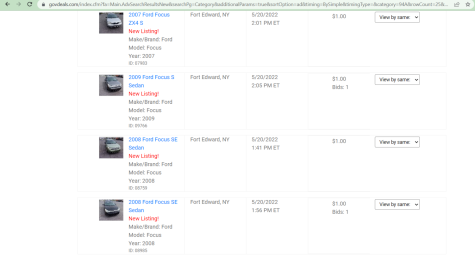Who knew you could purchase a car for just a few dollars?
Courtesy of sussexcountyde.com
Find items for cheap on GovDeals, a site that puts surplus items up for auction
A working fire truck for just four dollars? 14k tanzanite and white diamond earrings for just one? Does the seller even realize its actual value? What if I could guarantee you a car for some pocket change? Do you believe me when I say you can buy a McLaren or Ferrari if you increase your budget a little, let’s say to a few hundred dollars? Are you looking for a new laptop – I’m not, but for one dollar I might as well be – for school? These deals seem surreal: how could you possibly purchase such big-ticket items for so cheap; what’s the catch?
On a related issue, what happens when the government – for this example, we’ll use the local fire department – wants to get rid of a fire truck? How about mail without a clear address (you know how messy people’s writing can be). Where do its contents go? When the government seizes property, how does it get rid of it? What does the government do with surplus assets? Do they bring it straight to the dump (just checked; yes, you can find garbage trucks at pennyworth prices)?

That’s where GovDeals, a website that advertises itself as a liquidity services marketplace, comes in. On the site, you can sift through dozens of categories and find various items for eye-boggling prices. The site doesn’t judge. Whether it’s that eighties police helicopter you’ve been looking for (because last Black Friday’s deals simply weren’t enough), Kennedy Half Dollars that you’ve always needed for your collection, or a pile of mixed rock and dirt (we’re talking thousands of tons of it too), you can probably find it. In fact – just checked – there’s a baby grand piano going for only one dollar. Remember when your parents taught you that a dollar won’t get you anywhere in life? They’re most definitely wrong.
At first glance, GovDeals seems trustworthy, except for its prices. The website boasts that it has been around for nearly twenty years and claims it has generated more than two billion dollars by selling millions of items. Even so, the site does not have any reviews on Trustpilot; the Better Business Bureau lists dozens of complaints from people who purchased from its listings. Under each complaint, GovDeals responded with – in most cases – a long wall of text, consisting of legal mumbo jumbo.
When you go to purchase items on the site, you’ll find that their respective descriptions also have lots of text regarding your liability, the item’s details, and payment and shipping information. The descriptions are navigable, nevertheless, and are not as hard to comprehend as the legal responses on the Better Business Bureau site.
What seems most suspicious about the site, however, is its auction system. Once you’ve registered as a user of GovDeals, you can place a bid on any of the extremely cheap items on the site. So, I’m not guaranteed to get that new laptop I wanted for just one dollar; I might have to compete in a bidding contest. Still, in most cases, auctions on GovDeals never run too high and items are almost always sold for markedly less than retail price.
I wouldn’t be too worried about purchasing from GovDeals, though, especially because it’s a partner with the United States government. And, if you’re okay with reading through a page of product information to make sure you’re truly getting bang for your buck and potentially competing in an online bidding war, hopefully, you’ll be okay with GovDeals’ shipping system too (or rather, the lack thereof).
In some select cases, shipping plans can be negotiated with the seller; you can even use USPS to get the product to your house. However, in all other cases, you will need to pick up your purchase from a location designated by the seller. After all, it doesn’t make sense that you could purchase a car for one dollar and get free shipping. Shipping cars, especially when across the country, can easily prove expensive.
Despite all the potential hurdles one needs to jump over to buy an item on GovDeals, you’ll likely see me driving to school next year in a fire truck I purchased for only a few dollars. That’s if I pass my driver’s test and get my license, of course.


